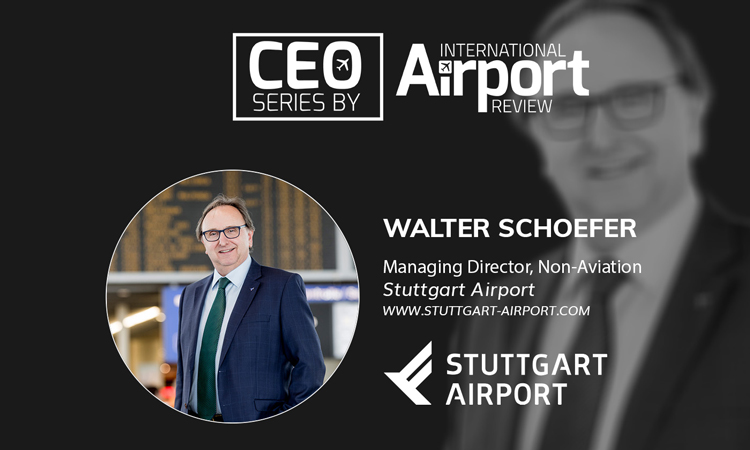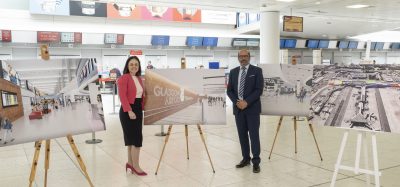Stuttgart Airport MD recognises the growing desire for responsible mobility
- Like
- Digg
- Del
- Tumblr
- VKontakte
- Buffer
- Love This
- Odnoklassniki
- Meneame
- Blogger
- Amazon
- Yahoo Mail
- Gmail
- AOL
- Newsvine
- HackerNews
- Evernote
- MySpace
- Mail.ru
- Viadeo
- Line
- Comments
- Yummly
- SMS
- Viber
- Telegram
- Subscribe
- Skype
- Facebook Messenger
- Kakao
- LiveJournal
- Yammer
- Edgar
- Fintel
- Mix
- Instapaper
- Copy Link
Posted: 31 January 2020 | International Airport Review | No comments yet
Walter Schoefer, Managing Director, Non-Aviation, of Stuttgart Airport, talks about the need to invest in sustainable and progressive infrastructure.


How did your career in the aviation industry begin?
Recently, I celebrated my 20th anniversary with Stuttgart Airport. In 1999, I changed from the Department for Budgeting in the Federal Ministry of Finance for Baden-Württemberg to the airport. My background as a lawyer and many years of experience within the administration of a federal state made the switch to the aviation world rather easy. At Stuttgart Airport, we share the leadership: As Managing Director, I oversee all non-aviation divisions, which comprises of real estate and infrastructure, as well as corporate communication. Since 2017, I have also been the management spokesman.
What is the most rewarding aspect of this role? On the other hand, what is most difficult?
The task of a managing director at an airport is very varied. You get to know and work closely with many people inside and outside the company. That is one of the best aspects of this job. At the same time, you need considerable endurance and patience, especially when you are responsible for infrastructure projects and real estate. Many years may pass from the original idea to implementation – German planning acts are complex. It is a lot like long-distance running.
Can you give us an overview of the three most exciting developments currently happening at Stuttgart Airport?
In spring 2020, we will renew part of the concrete surface of our runway. This is quite a challenge for us, because Stuttgart Airport only has one runway and air traffic continues to operate on the remaining section. For businesses in our region, the access to air traffic is of essential importance. The preparations for the runway renewal took several years, but we are ready to get started soon.
At the same time, we are planning the expansion and renovation of our terminal buildings. In 2020, an architectural competition will be organised for Terminal 4, the oldest of them all. It will be turned into a modern and sustainable airport building.
One of our long-term objectives is to connect the airport to the German railway network. In the future, there will be a station for regional and long-distance trains close to our terminal buildings. This is a major step for the airport as a transportation hub.
What is the biggest challenge Stuttgart Airport is having to tackle?
All of the mentioned infrastructure projects take place on our grounds. We will not expand the property, so it is a question of space. Renewing our terminal buildings with ongoing operations will be demanding. New requirements concerning security, process quality, passenger comfort and sustainability call for a modular expansion. We will, for example, first construct an interim building in order to reconstruct Terminal 4. Otherwise, we would lack space for our passengers.
At this moment in time, what do you see as the biggest disruptor to the aviation industry?
Within the discussion on climate change, the environmental impact of the aviation industry is at a critical point. Ecological consciousness is rising and people are questioning their travel behaviour. In line with our sustainability strategy, fairport STR, we play a role in raising awareness for climate-smart travelling. Stuttgart Airport has a long-standing cooperation with the German non-profit organisation, atmosfair. Our passengers can offset their flights with this organisation. But the recent transformation affects mobility as a whole. Cars are not as essential or important to young people anymore, car-sharing and other methods of travel gain users, and the market share of non-fossil drive systems is increasing. As an airport operator, we are involved in all of these transformative processes.
In your opinion, how does the aviation industry need to adapt to secure its place in the future?
We are facing a global climate crisis. All partners within the aviation industry – airlines, airports, aircraft and jet engine manufacturers – have to do everything in their power to make air traffic environmentally sustainable. This means investing in sustainable and progressive infrastructure, on the ground as well as in the air.
Paradoxically, the industry needs to get prepared for a global demand in growth at the same time, ensuring that flying remains safe, fast and comfortable.
What does the future of the aviation industry look like to you?
There is a growing desire for responsible mobility. People want, and often have to be, on the move. Economy and society are so closely linked that travelling by air remains indispensable.
On the ground, airport cities are further developing into hubs, both for mobility and businesses. An office close to an airport is an advantage to companies that operate globally and whose employees need to travel a lot. Therefore, the landside development will make big steps forward, along with strengthened air-traffic routes.
Walter Schoefer studied law at the universities of Tübingen and Kiel, before going on to work as a lawyer. His previous roles include Head of Department at the District Office of Main-Tauber; the personal consultant of the Minister for Culture and Sport; personal consultant to the minister in the Ministry of Finance for Baden-Württemberg; general consultant for budgeting (principles of budgetary policy); deputy head of department for budgeting; and head of staff for new taxation and conversion of state facilities (NeStUL).
Since 1 September 1999, Schoefer has been Managing Director of Stuttgart Airport. He is in charge of non-aviation, which comprises of real estate and infrastructure, as well as corporate communication, and has been the management spokesman since 2017. In 2001, he was appointed as a member of the advisory board of Baden-Airpark GmbH at Karlsruhe / Baden-Baden Airport and, since 2007, has been the chairman of the advisory board of HSG Airport Stuttgart Handels- und Service GmbH. Since 2002, Walter Schoefer has been the Managing Director of the project enterprise Neue Messe GmbH & Co. KG.
If you are a Chief Executive Officer, General Manager or Director of an airport and would be interested in participating in this series, please contact Leah Hockley, Junior Editor of International Airport Review.
Related topics
Airport construction and design, Passenger experience and seamless travel, Sustainable development


















